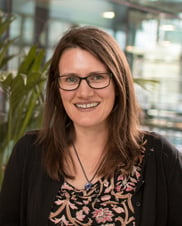-2.jpg)
Professor Hayley Fowler discusses the Adaptation Research Alliance, which was launched at COP26. Learn about the importance of integrating climate change mitigation and adaptation.
Climate financing for mitigation and adaptation actions
Going into COP26, adaptation is very much the poor man to mitigation. Only 20% of climate financing is committed to adaptation, with the rest committed to supporting the race to net zero, or reducing our greenhouse gas emissions through climate mitigation.
However, we will not get to net zero without significantly increasing our investments in increasing resilience through climate adaptation. Adaptation is a pressing need everywhere, but particularly in developing countries where climate resilience is lower.
More collaborative approaches required for climate change adaptation
Ironically, much of the research exists to solve our adaptation needs. It was noted at COP26 on Monday that transdisciplinary science plays a key role in meeting the adaptation needs of people, Co-developed solutions are key. This same approach was taken in the Centre for Climate and Environmental Resilience at Newcastle University, and our ONE Planet Doctoral Training Partnership.
.
An example of this is making the shift to impact-based forecasting, giving people the time to react and plan in Kenya. Top-down approaches to science are one reason for the gap between science and solutions – and the reason that science is not utilised by practitioners.
The role of the Adaptation Research Alliance
The launch of the Adaptation Research Alliance (ARA) on Tuesday will bring science into practice through a participatory approach. It will enable the development of tools and solutions for increased resilience that are based on stakeholder needs. This will strengthen the coping capacity of local communities to extreme weather.
The Adaptation Research Alliance will fund the development of better information on risks, better decision-making tools and better solutions. It will ensure the development of locally conceived, locally tested and locally owned science.
Research can play a positive role in engaging youth and women in particular in driving global action. Investments must leverage and strengthen the expertise that exists in the Global South, making sure they have the knowledge and expertise to drive local changes.
As Maarten van Aalst stated at the launch of the ARA on Tuesday:
“Climate change is a long-term environmental, but also a humanitarian, issue, yet research has not found its way into local communities where decision-makers need information. Research must provide solutions working with decision-making, answering questions that matter.”
Climate adaptation goes hand in hand with climate mitigation
But for this, we need strong leadership. We need to bring innovations together, finding and sharing best practices, data and tools, making research comparable to provide a strong body of evidence.
People on the ground already know what needs to be done to adapt and we cannot ignore approaches from the Global South. We can learn about effective flood warning systems for example from Bangladesh, where few people die in flooding disasters, yet hundreds died recently in Germany.
We need a pathway to resilient net zero with adaptation going hand in hand with mitigation. There is a strong need for multi-disciplinary teams to address these challenges – with meaningful partnerships fostered over time to develop the work. The new ARA shares the aims of the ONE Planet approach at Newcastle University, working together to make a more resilient world.
Find out more
The Adaptation Research Alliance
The ARA was conceived at COP25 by Dr Rosalind West, FCDO and Prof Anand Patwardhan, University of Maryland. The UK Government have committed £100M to the ARA.
About Professor Hayley Fowler
 Hayley Fowler is a Professor of Climate Change Impacts in the Water Resource Systems Engineering Group in the School of Engineering.
Hayley Fowler is a Professor of Climate Change Impacts in the Water Resource Systems Engineering Group in the School of Engineering.She is a hydroclimatologist with over 15 years of experience in analysing the impacts of climate change and variability on hydrological systems and has published more than 90 ISI-cited articles since 2000.
Professor Fowler has been named as one of the top 1,000 influential climate scientists worldwide by Reuters.
